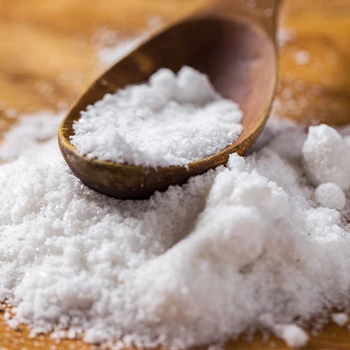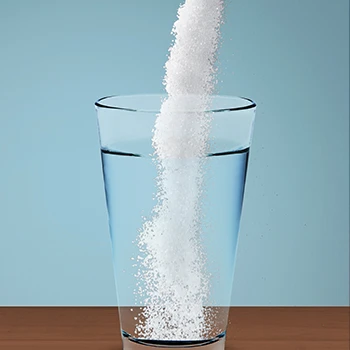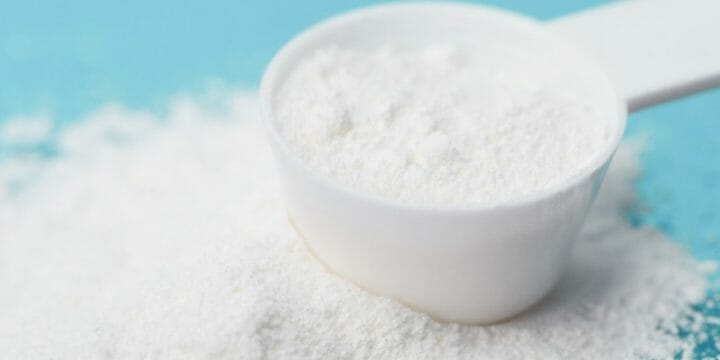Many of my fitness clients look for natural ways to boost athletic performance without dropping a lot of cash on pre-workout supplements.
One pre-workout supplement popular among athletes is sodium bicarbonate, also known as baking soda.
Baking soda is a common baking ingredient, home remedy, and cleaning agent with many uses, but what about as a pre-workout?
I worked closely with our dietitian at Total Shape for a couple of weeks to investigate the potential benefits of baking soda as a pre-workout.
Here’s what we found.
Quick Summary
- Baking soda, known for its high pH level, can be used as a pre-workout to delay muscle fatigue and enhance athletic performance.
- It works by neutralizing the lactic acid produced during high-intensity exercise, which may lead to a burning sensation and muscle fatigue.
- Sodium bicarbonate supplementation boosts performance by 3.1% in endurance and high-intensity activities.
- Personally, while baking soda can be a cost-effective pre-workout, I believe a balanced diet and proper hydration are equally important for optimal athletic performance.
Can Baking Soda Be Used As a Pre-workout?
Baking soda can be used as a pre-workout. I've tried baking soda an hour before my workouts and noticed a significant boost in endurance. Mixing it with a carb-rich snack helped me avoid any stomach discomfort.
But let’s take a closer look at this standard household product.
What is Sodium Bicarbonate?

Sodium bicarbonate, commonly known as baking soda, is a water-soluble substance with versatile properties, including its ability to turn alkaline in water and its traditional use in neutralizing stomach acid for alleviating heartburn [1].
Baking soda has various household uses: a fridge odor neutralizer, a teeth whitener, and everything in between.
The National Library of Medicine mentions that in cooking, baking soda has leavening properties because it interacts with acids like vinegar or lemon juice and causes the dough to rise by producing carbon dioxide [2].
How Does It Work?
Sodium bicarbonate works by neutralizing acid. Baking soda is a salt that, when added to water, breaks down into an alkaline solution that neutralizes acid [3].
Baking soda’s ability to neutralize acid makes it a popular home remedy for indigestion and heartburn, but what about athletic performance? Let’s take a look.
How Sodium Bicarbonate May Improve Athletic Performance

Baking soda's high pH may counteract exercise-induced acidity, potentially reducing muscle fatigue [4].
During high-intensity exercise, your muscles produce lactic acid and hydrogen ions, creating a more acidic environment responsible for that burning sensation you feel when working out.
Lactic acid may also lower the pH in your cells, potentially leading to fatigue [5].
A lower pH means higher acidity in your cells and muscles. Since baking soda is a base, meaning it has a high pH number, it helps neutralize acidity, potentially reducing fatigue and allowing you to work out longer [6].
PH Balance Is Important
The body's optimal pH is neutral, and baking soda may help maintain this balance during intense exercise.
Too much acidity in the body can overwork the heart, liver, and kidneys and cause muscle impairment.
Bicarbonate is a natural buffer part of your body’s acid-base balance, which maintains proper pH levels. During exercise, it helps clear acid out of muscle cells to restore optimal pH. It’s thought that bicarbonate supplementation may aid this process.
- Alina Petre, MS RD (NL)
The National Library of Medicine supports consuming baking soda before exercise to enhance physical performance in terms of speed, power, work capacity, and time to failure [7].
Webmd Studies suggest baking soda supplementation could enhance athletic performance and delay fatigue [8].
There are a couple of specific areas of athletic training that baking soda shows real promise in improving; interval training and muscle strength. We will look at those more closely now.
Interval Training

According to the International Society of Sports Nutrition, sodium bicarbonate supplementation enhances athletic performance in muscular endurance activities like boxing, judo, karate, taekwondo, and wrestling, and high-intensity exercise like cycling, and running, swimming, and rowing [9].
One study of Crossfit participants shows those who supplemented with baking soda experienced increased reps, ventilatory threshold, and overall workload.
Also, “fight gone bad” performance, a type of interval training specific to Crossfit, improved 3.1% over the placebo group [10].
The ventilatory threshold is worth noting as it is a marker of intensity that shows in a person’s breathing when lactate begins to accumulate in the blood [11].
There are three levels, VT1, VT2, and VO2max, and you can think of them this way:
- VT1 - Exercise increases so does breathing.
- VT2 - Exercise hits high intensity; you are out of breath.
- VO2max - You are exhausted.
Further research supports that taking baking soda before high-intensity exercise reduces muscle fatigue, such as this study that shows cyclists had a greater time to exhaustion, 4.5 minutes longer than the placebo group [12].
Muscle Strength

Research is mixed when it comes to studying baking soda prior to exercise to gain muscle strength.
A study of bodybuilders shows that the participants consuming baking soda were able to perform more squats in their first three sets, while there was no benefit to the bench press repetitions [13].
A meta-analysis showed no significant improvements in muscle strength after sodium bicarbonate supplementation [14].
Researchers define muscular strength as the amount lifted or amount of force a muscle can produce [15].
Given this information, it may be safe to assume that sodium bicarbonate may significantly affect muscle endurance rather than strength.
“Be sure your product is fully dissolved in the water prior to ingestion. Drink slowly over a period of 20 to 30 minutes. This may not be the most palatable concoction you’ve ever ingested.”
-Molly Breslin, Heath & Wellness Coach
Potential Risks

Sodium bicarbonate ingestion in the recommended dose (0.3 gram per kilogram of body weight) generally seems safe for most healthy individuals with no underlying medical conditions.
Research seems to support taking baking soda on a short-term basis only, and that long-term use is not advisable [16].
When consumed, baking soda hits the stomach acid and produces gas which can cause bloating, abdominal pain, diarrhea, and vomiting for some.
Taking sodium bicarbonate can also raise your blood sodium levels, which may cause high blood pressure for some people [17].
Sodium bicarbonate can affect how the human body absorbs certain medications, so it is always advisable to consult a healthcare professional before consuming it.
There are some definite don'ts when it comes to sodium carbonate consumption [18]:
- Do not take more than 3 1/2 tsp. of baking soda.
- Do not use it if you are diagnosed with GERD.
- Do not take the maximum daily dosage for longer than two weeks.
- Do not take it when your stomach is overly full; this can lead to gastric rupture.
- Do not drink the baking soda solution too quickly; this can cause gas and diarrhea.
- Do not consume if you are following a low-sodium diet.
Side effects of baking soda consumption seem to be dose-dependent and vary from person to person. A higher dose will generally make for worse side effects, while some people are not affected at all.
FAQs
Can Baking Soda Get Rid Of Lactic Acid?
Baking soda may get rid of the buildup of lactic acid in the muscles. During exercise, the body produces lactic acid, which raises the acidity level in the cells and muscles and contributes to fatigue. When mixed with water, baking soda creates an alkaline solution that helps neutralize the acid build-up, potentially reducing fatigue.
Can I Combine Baking Soda And Creatine?
You can combine baking soda and creatine; doing so has proven to enhance the workout performance of athletes performing high-intensity interval training (HIIT).
References:
- https://www.britannica.com/science/sodium-bicarbonate
- https://pubchem.ncbi.nlm.nih.gov/compound/Sodium-bicarbonate
- https://www.webmd.com/vitamins/ai/ingredientmono-1470/sodium-bicarbonate
- https://www.ncbi.nlm.nih.gov/pmc/articles/PMC5059234/
- https://www.healthline.com/nutrition/baking-soda-benefits-uses#health-benefits
- https://www.verywellfit.com/how-baking-soda-can-improve-athletic-performance-4057192
- https://pubmed.ncbi.nlm.nih.gov/27399820/
- https://www.webmd.com/fitness-exercise/health-benefits-exercise
- https://pubmed.ncbi.nlm.nih.gov/34503527/
- https://www.ncbi.nlm.nih.gov/pmc/articles/PMC5957406/
- https://www.acefitness.org/fitness-certifications/ace-answers/exam-preparation-blog/3139/what-is-the-difference-between-vt1-vt2-and-vo2-max/
- https://www.ncbi.nlm.nih.gov/pmc/articles/PMC4262454/
- https://pubmed.ncbi.nlm.nih.gov/24126895/
- https://pubmed.ncbi.nlm.nih.gov/32096113/
- https://www.healthline.com/nutrition/baking-soda-and-performance
- https://www.medicalnewstoday.com/articles/dangers-of-drinking-baking-soda
- https://www.drugs.com/sfx/sodium-bicarbonate-side-effects.html
- https://www.healthline.com/health/gerd/baking-soda#dosage
About The Author
You May Also Like






